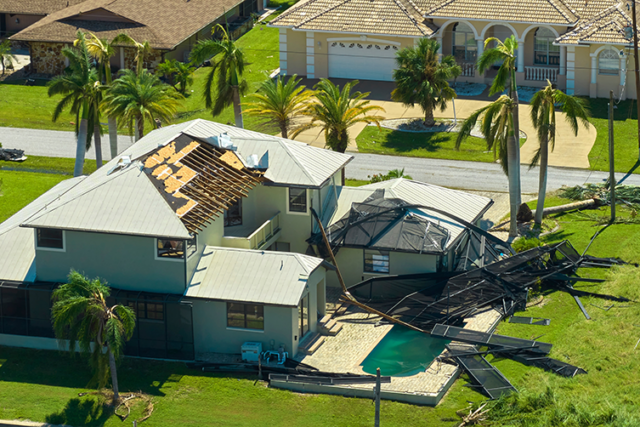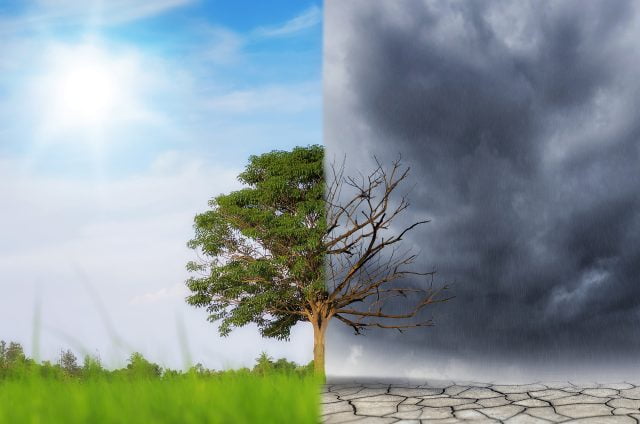
Add this to Your Retirement Expenses: Climate Change
Paul and Sandra McCrossan live on such high ground in Toronto that their neighborhood is a popular rest stop for migrating birds. But sodden ground affected their aerie when the city experienced its highest rainfall in recorded history in August.
For the first time, their basement showed traces of moisture. And for Paul McCrossan, unusually heavy rainfall due to climate change was a risk to his home that he wasn’t willing to tolerate. The couple spent $10,000 coating the outside walls of their basement to protect them from water and making sure the drains in the widow wells were clear.
“These were unanticipated but not unmanageable expenses,” McCrossan, who had a long career in insurance as a risk manager, said in a phone interview. “However, with the change in the weather patterns and increased precipitation and winds, I anticipate that a lot of retired people who are house rich and asset poor are going to be hit.”
Hanna Grichanik, a financial adviser with Northwestern Mutual, said she speaks regularly with clients about planning for expenses to maintain their homes in retirement. That means routine maintenance but could also include updates to cope with more wildfires in California, flooding and hurricanes in Florida, or power outages in Texas when a Blue Norther sweeps down the state and freezes the grid.
She said property insurance premiums are skyrocketing in some places, and she knows Texans are buying $20,000 generators to get ready for the next freeze or strong winds from the next Hurricane Beryl.
“In retirement planning, I always tell people you own your house, and they don’t just stop needing renovations,” Grichanik said. “You need to budget for that.”
The McCrossans have confronted a different climate issue at their oceanfront condominium in New Smyrna, Florida, north of Cape Canaveral. The hurricanes that batter Miami often bounce up to the Carolinas. But heavy winds and rains affect homes all along Florida’s eastern coast.
Their property has had only minor wind damage but others nearby have had more. The state also passed costly new regulations in the wake of the Surfside condominium collapse three years ago due to saltwater incursion that killed 98 residents. Compliance with the new regulations is resulting in assessments for some condo owners to make overdue repairs or replenish the cash reserves in case repairs are needed. McCrossan said his extra assessments are mainly paying for inspections to ensure the building’s structural soundness.
Property values can also plummet when a hurricane or flood slams neighborhoods on or near the water, affecting retirees’ finances or devastating a home they had intended to leave to their children. As weather extremes intensify, many more properties and retirees will be affected, experts say.
Property values, especially on the East Coast, do not fully reflect the potential for a negative impact from storm damage and flooding, according to a study in the journal Nature, which estimated that flood-prone residential properties nationwide are overvalued by, at minimum, $121 billion.
“The increasing burden of flooding under climate change has led to growing concerns that housing markets are mispricing these risks,” the authors concluded, potentially “causing a real estate bubble to develop.”
Climate change is here. The consequences are only now beginning to be understood.
Squared Away writer Kim Blanton invites you to follow us @SquaredAwayBC on X, formerly known as Twitter. To stay current on our blog, join our free email list. You’ll receive just one email each week – with links to the two new posts for that week – when you sign up here. This blog is supported by the Center for Retirement Research at Boston College.
Comments are closed.







Yes, this is so true. We spent $20K on upgrades to mitigate wildfire damage and, of course, there is no guarantee it will completely keep our home safe. We are lucky to still have insurance coverage.
Good thinking – thanks.
Right on about the increased risk for wildfires, especially grass fires.
Unfortunately the press has not landed on this threat and treat each fire as an isolated incident so homeowners are not aware their homes are at risk (ours is a very high risk) for damage or destruction.